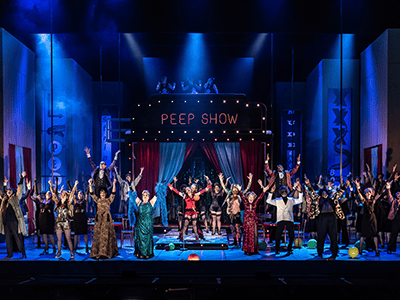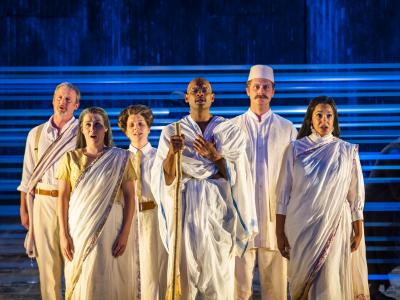An introduction to Glass’s Orphée
Here’s everything you need to know about ENO’s production of Glass’s Orphée.
It’s a chamber opera by Philip Glass
First performed in 1993, Orphée is a story about the dangers of self-obsession.
Orphée falls in love with the enigmatic Princess, even though he is married to Eurydice, and becomes obsessed with immortality. Travelling through mirrors, he follows her between the worlds of the living and the dead. It is only when the Princess sacrifices herself that Orphée becomes immortal, and he and Eurydice can continue their lives together.
A chamber opera has fewer musicians in the orchestra than a full-scale opera. Benjamin Britten’s The Turn of the Screw is another example of a chamber opera.
Video
Philip Glass is a minimalist composer
Philip Glass is often regarded as one of the most influential composers of the twenty-first century, thanks to his minimalist scores.
The composer is best known in the opera world for his ‘portrait trilogy’, works based on leaders from religion, politics and science.
The first opera in the series, which premiered in 1976, Einstein on the Beach, features the famous scientist. As with most of Glass’s operas it doesn’t follow a conventional narrative. Satyagraha (1980) depicts Gandhi’s non-violent campaigns against racism. Akhnaten (1983), the last in the trilogy, is inspired by the eponymous Egyptian pharaoh.
Video
It’s based on Jean Cocteau’s 1950 film Orphée
Set in contemporary Paris, Orphée is French polymath Jean Cocteau’s bold cinematic interpretation of the Orpheus myth.
Throughout the film, Cocteau uses low-tech special effects, such as playing shots in reverse, to create the magic we see on screen. In order to pass through mirrors (the doors to the underworld), pools of mercury are used to give the perception the actors were moving through glass.
The libretto for the opera draws from Cocteau’s film script, although for our production the French words are translated to English.
It’s part of a trilogy of works based on films by Jean Cocteau
Premiering in 1993, Glass’s Orphée is the first in the series. La Belle et la Bête (Beauty and the Beast) premiered the next year, based on Cocteau’s 1946 film of the same name. This was followed by Les Enfants Terribles (The Terrible Children), which was first performed in 1996.
Unlike the other two films, Les Enfants Terribles wasn’t directed by Cocteau, although it is based on his 1929 novel of the same name. The 1950 film is directed by Jean-Pierre Melville but commissioned by Cocteau.
Video


